Contents
Cherry Raditsa is an excellent variety with high yields. Being a very thermophilic fruit tree, it is very demanding on climatic conditions and soil. Raditsa can hardly endure winters with a small amount of snow and hard frost, therefore it often freezes. At the same time, the capriciousness of sweet cherries is compensated by a rich harvest of large, juicy and incredibly sweet fruits.
History of breeding
The Raditsa variety was obtained by crossing Kommunarka and Leningradskaya black at the All- Research Institute of Lupin by the famous breeder M.V. Kanshina. In 2001, it was entered into the State Register of Breeding Achievements. Experts recommend planting cherries in the Central region.
Description of the culture
Cherry Raditsa is a rapidly growing, beautifully leafy tree of medium height, endowed with a wide rounded crown of moderate density.
The kidney is large, vegetative, has the shape of a cone, strongly deviated, generative.
The leaves of the sweet cherry Raditsa are obovate, elongated, medium-sized, bright green in color, with a pointed tip, and have a round base. The leaves are serrated, the plate is straight, the pigmented petiole is medium in size, it has 2-3 glands.
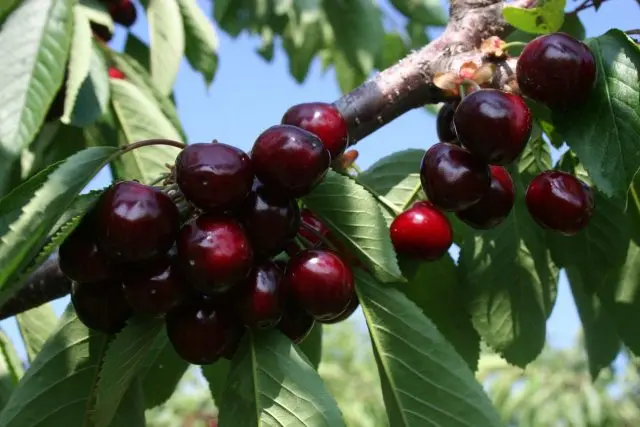
Each inflorescence contains three medium-sized flowers (petals slightly overlapping, snow-white in color, the stigma of the pistil is located on the same level with the anthers, the cup is goblet, the stamens and pistils are elongated). Fruiting, as a rule, is concentrated on bouquet branches (60%).
The size of a ripe cherry Raditsa, which varies from 4,6 to 5,7 g, is considered to be average. The fruit is oval in shape, with a voluminous funnel and a rounded top, rich burgundy, almost black; the flesh is dark red, with a moderate density. The stone is beige, makes up 5,2% of its weight, easily separated from the pulp. Ripe sweet cherry Raditsa is very sweet (11,2% sugars), with barely noticeable sourness (0,4%). 100 g of the product contains approximately 13,5 mg of ascorbic acid. The taste of berries is excellent, ripe fruits do not crack.
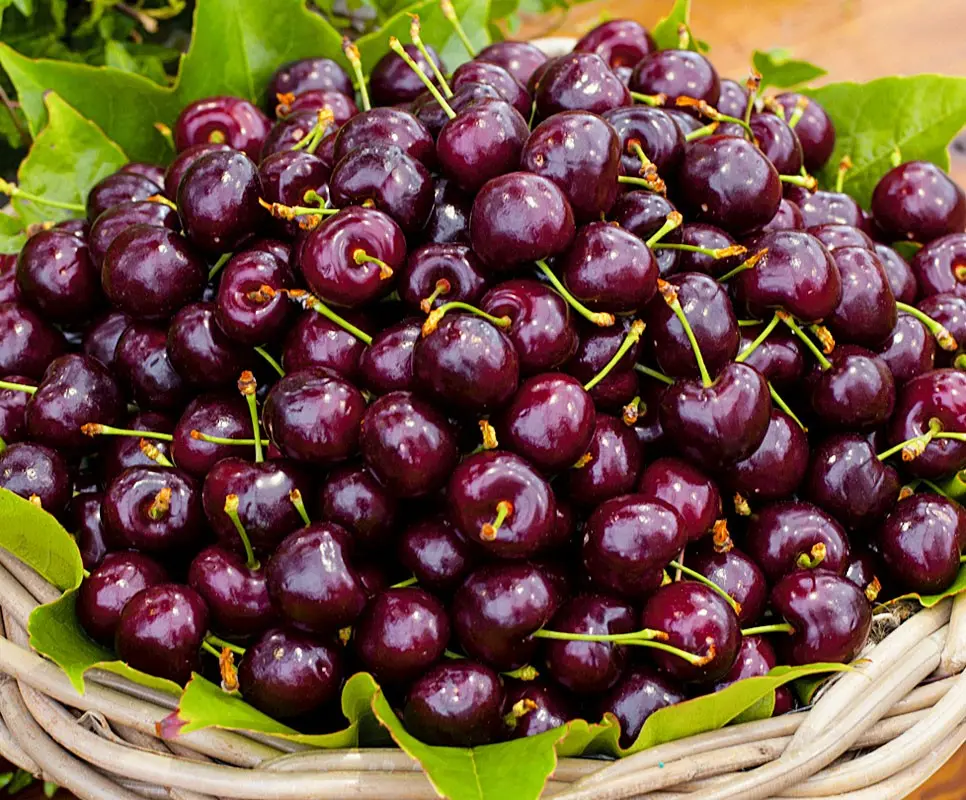
Features
The characteristics of the Raditsa cherry variety are quite attractive to gardeners.
Saplings of the Raditsa variety grow rapidly, the height of the Raditsa cherry tree is approximately 4 meters. In the tests carried out at air temperatures from 29 to 34 degrees below zero, an adult plant froze only one and a half points.
Drought resistance, winter resistance
The variety Raditsa is not drought-resistant. Cherry loves watering and requires it regularly, while categorically does not tolerate stagnant water, and due to excess fluid, ripe berries are able to burst during the ripening period.
Before winter, it is worth making a water-charging recharge. Adult plants are watered several times during the growing season, in autumn – once a week.
Frost resistance of sweet cherry Raditsa is moderate. The plant easily tolerates low temperatures under snow, but young seedlings need to be protected from frost in harsh winters with little snow.
Pollination, flowering period and ripening period
Cherry Raditsa is a self-fertile variety. The best pollinators for Raditsa cherries:
- Jealous;
- Ипуть;
- Tyutchevka.
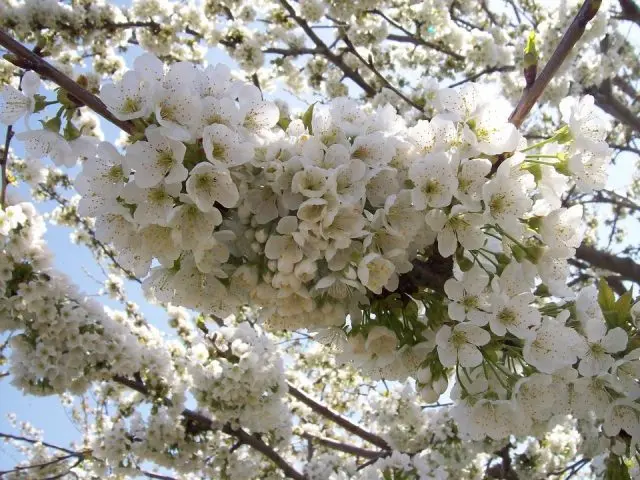
yield, fruiting
Raditsa is a sweet cherry variety with high yields. The fruits of a bright ruby hue ripen together by the beginning of summer. An adult sweet cherry begins to bear fruit at 4–5 years of age. On one hectare of plantations, Raditsa sweet cherries can bring an average of 60 centners of a rich harvest.
Scope of berries
Ripe fruits of the early sweet cherry Raditsa can be consumed fresh, boiled juices, compotes, tinctures, jams, jelly; the berries are also frozen, candied and dried.
Sweet cherries can have a mild diuretic and laxative effect on the body, as well as help normalize the intestinal tract. Experts advise eating cherries for peptic ulcers of the stomach and duodenum, as well as for gastritis.
Disease and pest resistance
The variety of sweet cherry Raditsa is resistant to coccomycosis and moniliosis, as well as to clasterosporiosis. To the first two diseases, the plant has almost one hundred percent immunity, but the possibility of being affected by clasterosporiosis is 50%.
Advantages and disadvantages
As the main advantages of the Raditsa variety, it is worth noting:
- high productivity;
- sweet large fruits;
- moderate frost resistance;
- versatility in use;
- immunity to the main diseases that affect plants of this species.
Disadvantages:
- a large height of the trunk, which makes it difficult to collect fruits;
- lack of drought resistance;
- self-infertility.
Features of landing
Before planting a Raditsa cherry seedling, its roots should be placed in the Kornevin solution for half a day. After that, the young tree needs to be examined carefully, getting rid of the damaged areas of the rhizome.
- A stake is driven into the recess.
- The seedling is lowered onto an earthen cone on the south side of the driven stake.
- The roots must be straightened so that they do not twist, sprinkle the seedling with earth.
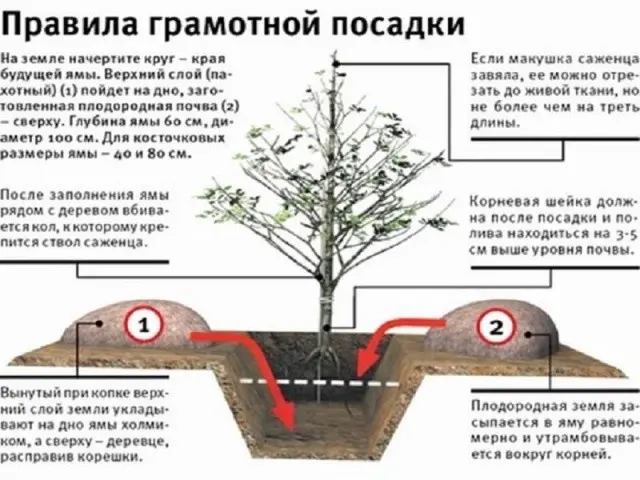
Recommended dates
A seat in the form of a pit should be prepared in the fall. Young seedlings are placed in the ground in early spring, almost immediately after the snow melts, but before the buds swell.
Choosing the right place
Planting and caring for Raditsa cherries, done in a competent way, is the key to healthy plants and a bountiful harvest.
Raditsu is recommended to be planted in a sunny place, sheltered from strong winds.
The second condition is the moderate acidity of the soil.
In the event that the soil has high acidity, you need to sprinkle it with lime or dolomite flour and dig up the soil. After a couple of weeks, at a distance of 3 m from each other, they dig holes for planting: 0,8 m wide, 0,5 m deep, mixing several buckets of compost or humus with the top layer of the earth. In the spring, 1 kg of ash is required to be poured into the pit, and then a cone is formed from the resulting mixture at the very bottom.
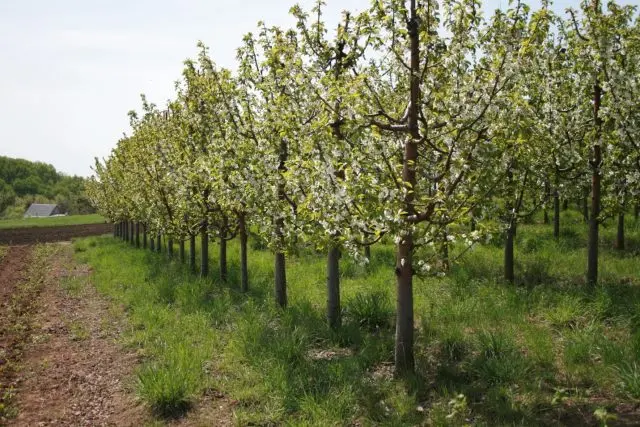
What crops can and cannot be planted next to cherries
Properly selected neighbors will have a beneficial effect on the growth and development of young sweet cherries (for example, they will protect against diseases and pests), while some plants can cause irreparable damage to Raditsa (growth slows down, seedlings begin to hurt and wither).
When planting a young Raditz cherry in the garden, you should not place it close to the following plants:
- apple trees (you can plant, keeping a distance);
- raspberries, kryžovniku (plants have a superficial root system: bushes take the most useful substances from the upper layers of the soil, which slows down the development of fruit trees in the neighborhood);
- sea buckthorn (a plant endowed with a developed and powerful root system is able to oppress its neighbors, preventing the successful formation of their roots);
- plants from the nightshade family (tomatoes, eggplants, tobacco): they can become a focus of verticillium wilt (a disease that affects the wood of a tree, as a result of which it begins to wither and eventually dies).
Plants are able to have a positive effect on a young seedling:
- cherries and sweet cherries of other varieties (pollinators);
- cherry plum and plum trees (capable of protecting against diseases and pests);
- elderberry (excellent protection against aphids);
- grapes;
- honeysuckle.
Selection and preparation of planting material
- When choosing a seedling of the Raditsa cherry, you first need to make sure that it has a grafting site. This sign indicates that the tree is varietal.
- The diameter of a smooth trunk must exceed 17 cm.
- A healthy biennial plant should have at least four branches, each 40 cm long.
- The rhizome must not be dry.
Before planting in the ground, it is required to rid the trunk of leaves so that the nutrients are consumed evenly, in the right way.
Landing algorithm
Growing sweet cherries Raditsa requires a careful approach and the implementation of an algorithm of sequential actions.
- When planting, the sweet cherry must be raised so that the root collar is no less than 4 cm above the ground.
- The trunk of the tree is tied to a stake, forming a figure eight from the tape so that the trunk is not damaged during the growth process.
- A hole is formed next to the trunk, pouring a roller of soil around the circumference and pouring several buckets of water under each tree.
- From above you need to put mulch from peat or humus.
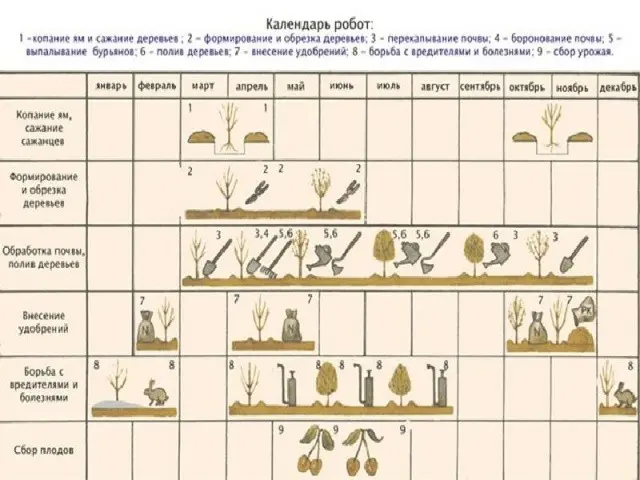
Culture aftercare
In order for the Raditsa sweet cherry to please with its fertility and appearance, it is necessary to provide high-quality care:
- it is necessary to feed a young plant only in the second year of growth (until this time, it has enough useful minerals and fertilizers introduced into the pit during planting);
- in the middle of spring, the tree is fertilized with nitrogen;
- preparation for frost should begin in the fall;
- to obtain a rich harvest, it is required to enrich the soil under the cherry with green manure: lupine, sainfoin and vetch;
- to attract bees around the sweet cherry, you can sow mustard and phacelia, and in the fall mow them down and tamp them into the ground;
- in the year of planting, it is necessary to pay special attention to weeds;
- after a while, the near-stem distance should be expanded to 1 meter, gradually adding 50 cm and removing unnecessary vegetation.
Diseases and pests, methods of control and prevention
Key pest control measures include:
- from aphids, cherries are sprayed with “Confidor” until the buds swell and two weeks later. You can also eliminate parasites with a solution of tobacco dust (soap can be added to its composition to stick to the leaves);
- to get rid of cherry flies, yellow sticky plastic traps are placed on the trees until the flower buds open;
- it is customary to spray plants from moths with Nitrofen;
- in order to protect trees from birds, nets are thrown over the crown.
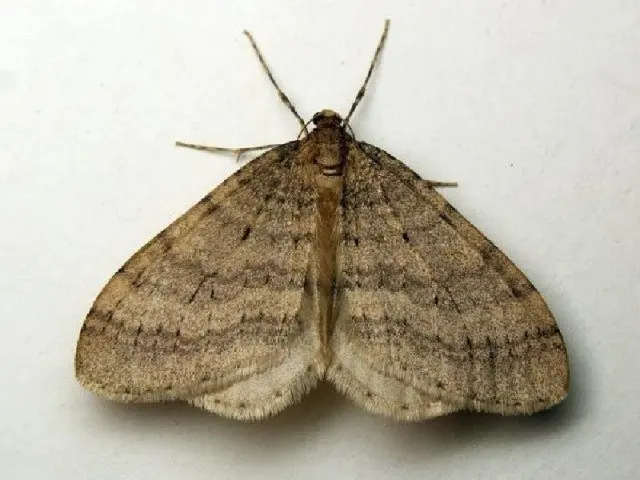
Conclusion
Cherry Raditsa is a worthy variety for the central region. Already four years after planting, the plant begins to bear fruit and produces a large number of large juicy fruits. Dessert qualities of Raditsa berries make them versatile for sale. The variety is endowed with immunity to most cherry diseases. Cherry care, carried out in a competent way, contributes to a bountiful harvest.









